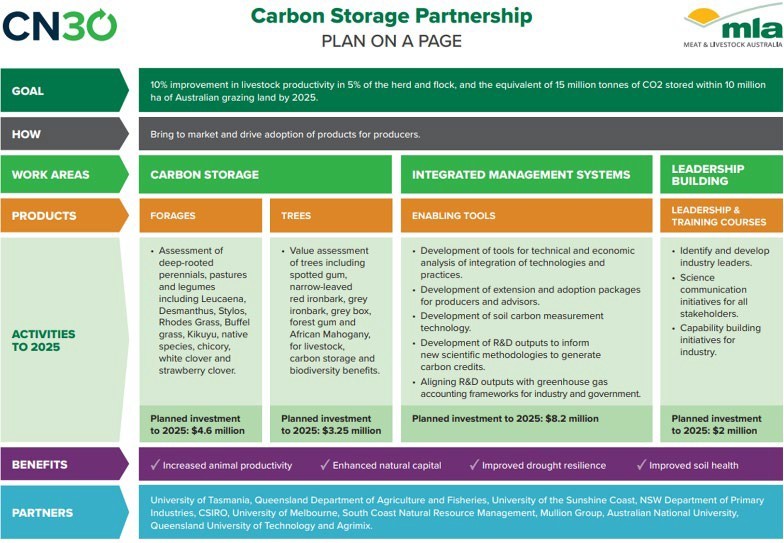Project details
Status: Current
The Carbon Storage Partnership (CSP) is an initiative of Meat & Livestock Australia (MLA) that aims to build the capability and capacity of Australia's livestock sector to become carbon neutral by 2030 (CN30).
The multi-million-dollar Partnership is led by Associate Professor Matthew Harrison at Tasmanian Instituted of Agriculture (TIA), and brings together a range of research, industry and government partners to develop the skills, technologies and practices needed to achieve the CN30 goal.
Supporting producers learn about carbon neutrality
A key focus of the Partnership is assisting and supporting producers to learn about the opportunities for carbon neutrality, and developing a pathway that is profitable, environmentally sustainable and socially acceptable.
In Australia, agriculture contributes approximately 13% of the total greenhouse gas (GHG) emissions, the third biggest sector followed by Stationary Energy and Transport (DISER 2020). About 68% of the agricultural sector's emissions are methane produced by ruminant digestion of cows and other livestock, with a further 10% from manure management processes.
The CSP is working towards the following outcomes:
- A 10% improvement in livestock productivity in 5% of the herd and flock, and the equivalent of 15 Mt of CO2 stored within 10 M ha of Australian grazing land by 2025.
- Providing producers opportunities such as:
- Understanding GHG emissions on-farm and opportunities for generating carbon credits to diversify income streams.
- Adopting promising new technologies for increasing carbon storage at scale in a profitable way.
- Contributing improved management practices and skills for improved environmental outcomes on farm.
- Learning from other producers and get involved through workshops, field days and other interactive sessions.
Research projects funded under the CSP include:
- Sustainable Pathways to CN30 (Tasmanian Institute of Agriculture)
- Data platform for increasing soil carbon in Australian agricultural systems (Agrimix / Queensland University of Technology)
- Time controlled grazing for soil C sequestration and improved ecosystem services (Queensland University of Technology)
- Maximising co-benefits of trees on farm (University of Melbourne)
- Steak ‘n wood: demonstrating livestock productivity and environmental service benefits of trees on farm in northern systems (Queensland Department of Agriculture and Fisheries)
- Hyperspectral remote sensing of soil organic carbon (Perennial)

Related resources
Browse fact sheets and project updates below.
Grazing management for soil carbon in Australia: A review
This review examined how livestock grazing management (e.g. animal densities and duration of grazing), as well as fertiliser, pasture species, soil type, climate and other forms of farm management impacted on soil carbon gain or loss
Operationalising net-zero with biochar: black gold or red herring?
This work explores implications associated with feeding biochar to cattle for greenhouse gas emissions, profitability, soil carbon and social licence to operate.
Clarifying confusions over carbon conclusions
This paper examines how initial soil carbon stocks influence gains or losses in carbon following management practice change. The paper shows the influence of soil texture, climate, management, fertilizer, crop type, sowing time, genotype and other factors on rate of change of soil carbon over time (sequestration).
How to fix Australia’s approach to soil carbon credits so they really count towards our climate goals
This Conversation piece problems associated with the Australian Government’s approach to crediting landholders for gains in soil carbon. Several suggestions for improvement are offered.
Costs of transitioning to net zero under future climates
This original research article explores economic and biophysical costs associated with implementing pathways towards net zero (genetic, agronomic, environmental, engineering, agroecological).
Advancing place-based crop modelling for global adaptation to crop waterlogging
This research demonstrates how advances in modelling analytics can be used to adapt to and overcome crop waterlogging. Multiple forms of adaptation to waterlogging are proposed (agronomic, crop genetics, engineering).
Cattle, cash, carbon and the climate crisis
This work examines the interplay between greenhouse gas emissions mitigation and climate change adaptation, together with implications for costs, food security and environmental stewardship.
Related stories
For more information contact:
Acknowledgements:
The Carbon Storage Partnership (CSP) is an initiative of Meat & Livestock Australia (MLA) that aims to build the capability and capacity of Australia's livestock sector to become carbon neutral by 2030 (CN30).